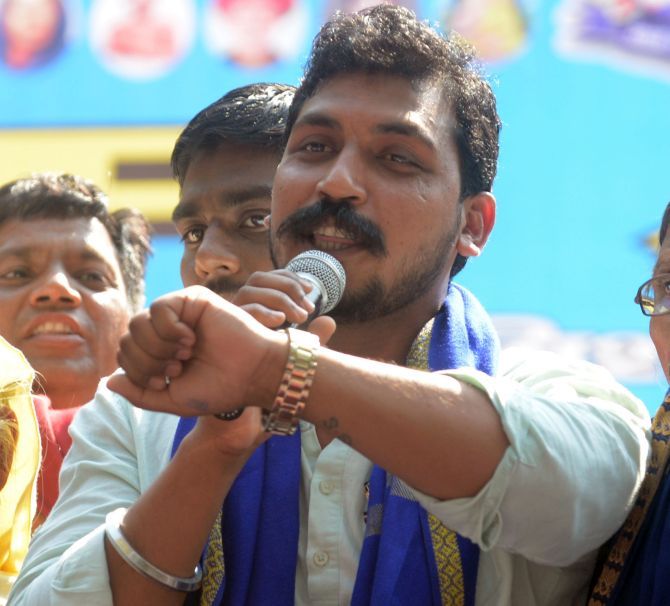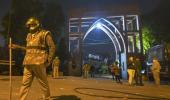
A Delhi court on Wednesday granted bail to Bhim Army chief Chandrashekhar Azad who has been accused of inciting people during an anti-Citizenship Amendment Act protest at Jama Masjid in New Delhi on December 20, while restraining him from visiting Delhi for four weeks.
The court further directed him not to hold any dharna in the national capital till the elections here and said that 'the nation cannot be exposed to anarchy'.
Additional Sessions Judge Kamini Lau granted the relief to Azad on furnishing a bail bond of Rs 25,000 with two sureties of like amount.
The court also said that before going to Saharanpur if Azad wants to go anywhere, including Jama Masjid in Delhi in 24 hours, police will escort him there.
"There is no material in the form of CCTV footage or audio recordings to prima facie show the direct involvement of the accused with the alleged violence and it was admitted by the police that the CCTV footage upon which they were placing their reliance was of a very poor quality which does not even reflect the presence of other accused who have already been granted bail," the judge said.
Special circumstances call for special conditions, the judge said.
During the verdict pronouncement, the counsel for Azad, advocate Mehmood Pracha, said the Bhim Army chief faces threat in Uttar Pradesh.
"Whenever the accused is required to come to Delhi for his medical treatment, he shall inform his schedule to the DCP of the crime branch and the SHO of Fatehpur police station at Saharanpur, who shall convey the same to DCP Crime Branch, Delhi. During the period of his visit, the accused shall be under an escort," the court said.
It further clarified that the condition has been imposed till February 16.
"Violence or destruction of property was totally unacceptable and for any kind of damage to private or public property during the protest, it is the organisers who would be responsible for the damage and liable to compensate for the loss.
"There has to be zero tolerance for any kind of violence and lawlessness cannot be encouraged. The nation cannot be exposed to anarchy.
"Of course, it goes without saying that protests do lead to inconvenience but it has to be ensured that these protests do not last for a long time at places under public use," the court said, in its order.
The court further said that while exercising one's right, another's should not be violated and no inconvenience should be caused to anyone.
"I may observe that in our democratic set-up, we have a fundamental right to peaceful protest guaranteed by the Constitution, which cannot be curtailed by the state.
"However, at the same time, our constitution strikes a fine balance between the rights and duties.
"While exercising our right of peaceful protest, it is our duty to ensure that no corresponding right of another is violated and no inconvenience was caused to anyone," the judge said.
It further said that reading of the preamble to the Constitution of India cannot prim facie be taken as incitement.
"I may observe that for the judges, legal persons and the offices under the constitution, the Constitution of India is a sacred document and if this was correct, then reading this document cannot prim facie be taken as incitement.
"While on one hand the accused specifically affirms that he read out the preamble, the investigating officer claimed that he had made inflammatory statements, details of which have not been placed on record, so much so that there was no statement of any eye witnesses to affirm the same," the judge said.
The court further said that the protest call was only for one day and the march was from Jama Masjid to Jantar Mantar and no assessment of damage has been made till date.
Earlier, the investigating officer of the Crime Branch of Delhi police had alleged before the court that Azad can be clearly seen giving 'inflammatory speeches' at a large gathering at Jama Masjid, in the drone camera footage available with them.
The counsel appearing for the police, had said that the allegation were serious and sensitive in nature involving commission of offence against the nation and not against any individual, which in itself is a heinous crime.
Earlier, the court had said that people are out on streets as what should have been said inside Parliament was 'not said'.
Asserting that it is one's constitutional right to protest, it had also observed that Delhi Police was behaving 'as if Jama Masjid was Pakistan'.
Azad's outfit had called for a protest march from Jama Masjid to Jantar Mantar against the Citizenship (Amendment) Act on December 20, without police permission.
Other 15 people arrested in the case were granted bail by the court on January 9.












 © 2025
© 2025